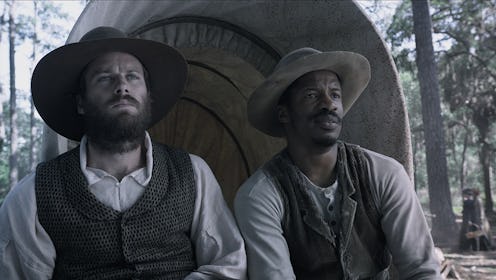Entertainment
This Is The One Sundance Movie To Know Right Now

During my eight days at the Sundance Film Festival, I saw movies that ranged from sweet crowd-pleasers (Captain Fantastic; Life, Animated) to emotional heartbreakers (As You Are; Manchester by the Sea), but one film was in a category all its own: Nate Parker's slavery epic, The Birth of a Nation . The film, a biopic of the legendary rebellion leader Nat Turner, was the most talked-about movie at the festival, and for good reason; a searing, powerful look at the realities of slavery and the life of one remarkable man, Birth of a Nation is truly unlike anything that Hollywood has ever made. It may only be February, but mark my words: this film is the Sundance debut you'll be talking about for many, many months to come.
That said, The Birth of a Nation is far from a perfect film. The script isn't particularly strong, the magical realism aspects aren't needed, and not all members of the cast are quite as good as you want them to be. It's a decent movie, but not a great one, and compared to some of the other films I saw at Sundance this year, it wouldn't even make it into my top five. Yet while all that is certainly true, it doesn't mean that Birth of a Nation is a movie I, or anyone, could easily dismiss after viewing. It's simply too powerful, and too important.
The film is everything a Hollywood film "shouldn't" be, at least according to current standards. It's a story about slavery, a subject generally considered too dark and uncomfortable to explore on-screen. It stars a predominantly black cast, and the film industry, as we all know, is not exactly the most diverse landscape. It's made by Nate Parker, a relatively unknown actor who'd never before directed, written, or produced a film. And, perhaps most significantly of all, there's the fact that the movie doesn't feature a white savior, or redemption for its white, slave-owner characters — they are villains, and stay villains, for the entirety of the film.
In other words, this movie should never have gotten made, and it's a testament to the perseverance of Parker, who worked on the film for seven years, that it did. And the result of his efforts is remarkable — he made a movie that, while seriously flawed, manages to be unforgettable. There is no way to sit through this film, viewing the physical and emotional atrocities that it depicts, without being deeply moved. Birth of a Nation shows the reality of slavery without hiding or sugar-coating anything; even the violence that it chooses not to explicitly show but imply, like a character's rape, has enormous emotional impact. The film aims to be eye-opening and painful, and even those like myself who didn't love the film's storytelling can fully admit that in this regard, it succeeds tremendously.
So it's no wonder that Birth of a Nation has had such a huge impact since its debut screening. There were the standing ovations, the enthusiastic Q&As, and, of course, the historic $17.5 million spent by Fox Searchlight to acquire the movie's distribution rights. Even outside of Sundance, people have been talking non-stop about Parker's achievement, with everyone from Ava DuVernay to Oprah Winfrey chiming in with praise for the director and his work. There've already been whispers of Oscar nominations for the film, despite the fact that this year's ceremony hasn't even happened.
It's been truly great to see so much support for the movie, considering how un-Hollywood its themes, cast, and storylines are. In a time when the homogeneity of the film industry is as clear as its ever been, it's wonderful to know that a film about slavery, made by a black debut director, is one of the year's most talked-about movies so far. Exactly how long its momentum will hold is unclear — winter releases, no matter how big at the times of their debuts, tend to get forgotten by late fall's awards season — but for now, Birth of a Nation is, rightfully, the one movie that's on everyone's minds.
Images: Fox Searchlight